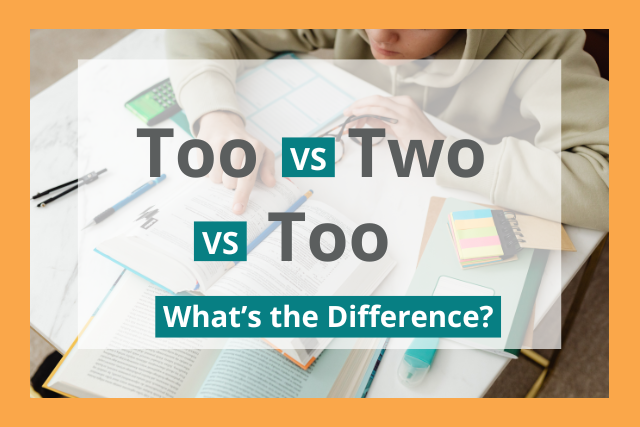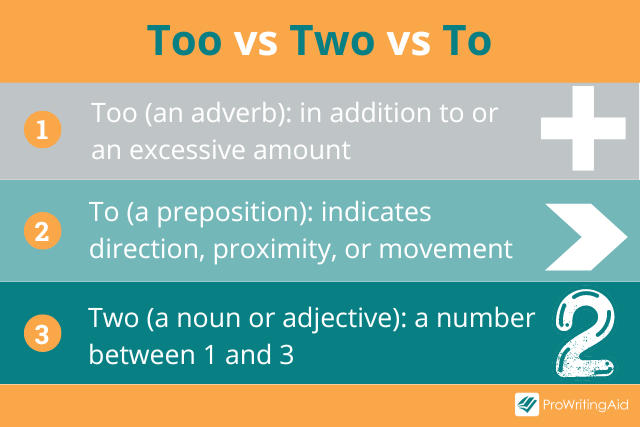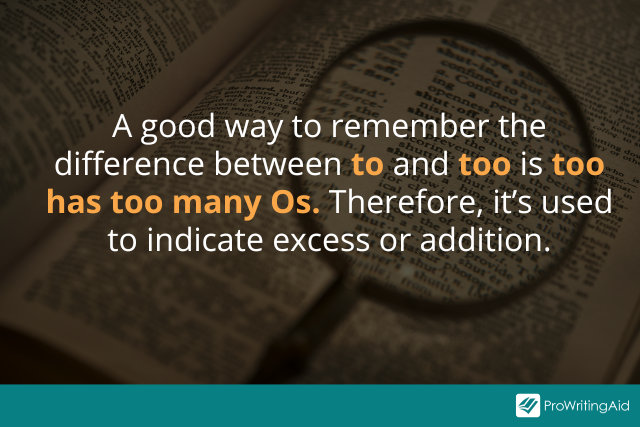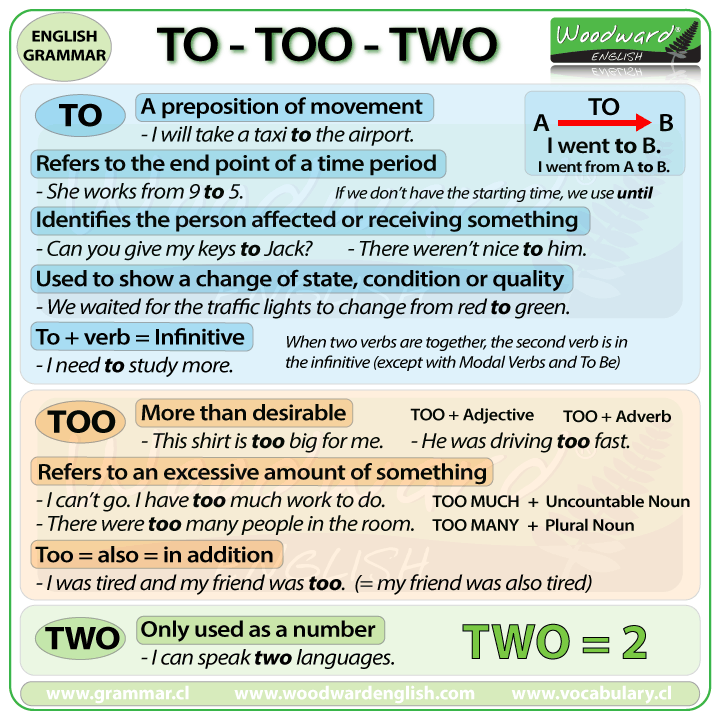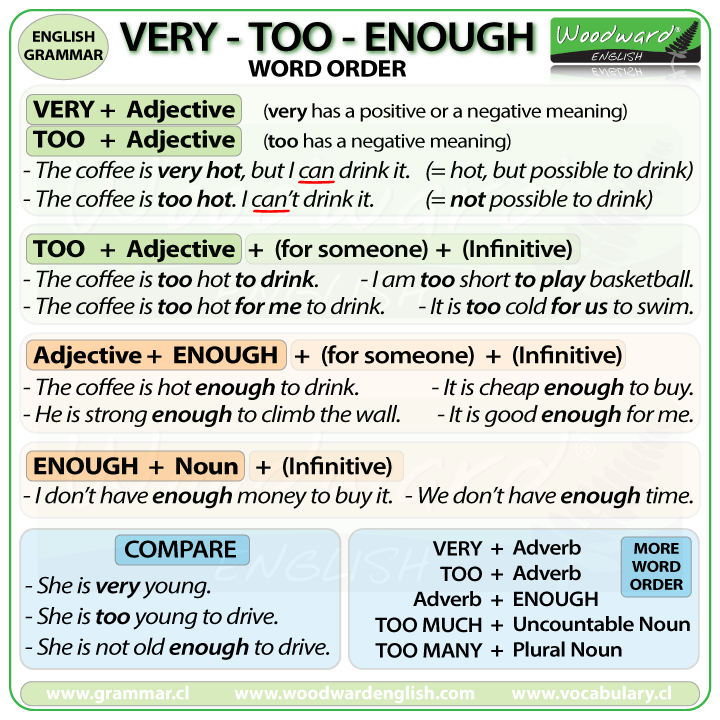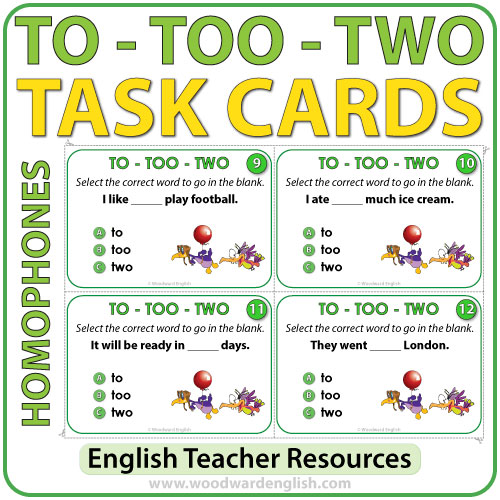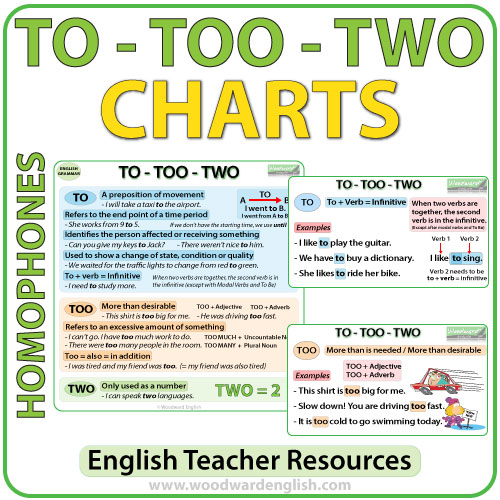Three commonly confused words in the English language are to, too, and two. These three words are homophones, meaning that they’re pronounced the same way, but they’re all spelled differently, and they have very different meanings.
So when should you use each word?
The short answer is that to is a preposition that indicates direction, too means also or indicates excess, and two is a number.
Read on to learn the distinct meanings of to, too, and two and to see examples of how to use these words in sentences.
Quick Definition and Meaning of “To”
To is a preposition with several meanings. Some of these meanings refer to proximity, distance, movement, location, and purpose.
Most often, to is used to indicate a direction toward something. If you say, “I drove to the office,” that means you drove in the direction of the office.
To can also be used with a verb to create its infinitive form. For example, you might say “I love to dance.”
To also expresses a range. For example, you might say, “I’ll be ready in five to ten minutes.”
Here are some other examples of when to use to:
- I don’t want to leave the party.
- I like visiting my friends in America from time to time.
- You have to pass the exam in order to graduate.
Quick Definition and Meaning of “Too”
The word too is an adverb with two meanings.
The first meaning is also or in addition to. For example, you might say “If you’re going to the concert tonight, I want to come too.”
Too can also be used to indicate an excessive degree. It can mean something similar to very or an excessive amount. If you say, “The dish was too spicy for me,” that means you think the dish was excessively spicy.
Here are some other sample sentences of when to use too:
- I have class tomorrow, too.
- The young puppy had too much energy.
- It was too late to take back his mistake.
Quick Definition and Meaning of “Two”
Out of the three words to, too, and two, two is probably easiest to understand. Two only has one meaning: it’s the integer between one and three.
For example, you might say, “I have to leave in about two hours.”
Here are some other examples of when to use two:
- I have two sisters.
- I only know two words in Spanish.
- Spiders have eight eyes, while most animals only have two.
What’s the Difference Between To vs Too vs Two?
To, too, and two all serve different roles in a sentence. As a general rule, you can remember their parts of speech to remember their separate meanings:
- To is a preposition
- Too is an adverb
- Two is a noun or an adjective
Whenever you’re expressing a number, you should use two instead of to or too. One tip is to remember that two starts with TW like the word twins also starts with TW, and twins refers to two children born at the same birth.
A good way to remember the difference between to and too is too has too many Os. Therefore, it’s used to indicate excess or addition.
Examples of To, Too, and Two Used in Sentences
The best way to learn how to spell words correctly is to look at examples of how they’re used in the real world. Here are some examples of how to use to vs too vs two in a correct sentence.
Let’s start with some examples of to:
“Henry was invited to book launches and literary festivals around the world.”—Yann Martel, Beatrice and Virgil
“He pounded on the earth, trying to keep the hands from pulling him under.”—Roy Johansen, Beyond Belief
“I wanted to write, and just tell you that me and my spirit were fighting this morning.”—Peter Straub, In the Night Room
Now let’s look at some examples of too:
“By the time he decided to act, he’d been too late.”—Nora Roberts, The Heart of Devin MacKade
“The kitchen, too, disappeared under a pile of rubble.”—C.T. Adams and Cathy Clamp, Touch of Darkness
“The body holding the guitar in its hands has a name, too.”—Maurice G. Dantec, Grand Junction
Finally, here are some examples of two:
“Two roads diverged in a wood, and I—I took the one less traveled by, and that has made all the difference.”—Robert Frost, “The Road Not Taken”
“As you grow older, you will discover that you have two hands: one for helping yourself, the other for helping others.”—Sam Levenson, In One Era & Out the Other
“For the two of us, home isn’t a place. It is a person. And we are finally home.”—Stephanie Perkins, Anna and the French Kiss
Conclusion on To vs Too vs Two
Now you know the full difference between to vs too vs two.
If you’re not sure which spelling to use, you can always run your writing through ProWritingAid, which will highlight incorrect words and guide you toward the correct option. It’s great for picking up tricky homophones like these.
Take your writing to the next level:
20 Editing Tips from Professional Writers
Whether you are writing a novel, essay, article, or email, good writing is an essential part of communicating your ideas.
This guide contains the 20 most important writing tips and techniques from a wide range of professional writers.

To, Too and Two are three words that native English speakers sometimes spell incorrectly when writing.
WHY?
Because these three words are Homophones. A homophone is a word that is pronounced the same as another word but differs in meaning, and may differ in spelling. So To, Too and Two are pronounced the same though both the spelling and the meaning of each word is different.
Here is a new chart which highlights the main meanings and uses of To, Too and Two:
You can find more example sentences with additional details about the use of each word here: To vs Too vs Two
Once you feel comfortable with the rules, why not try the following game: To – Too – Two – English Game
Just to take it a little further, here is another chart I created which compares Too with Very (and Enough):
You can find more details about the difference between Too, Very and Enough here: Very vs Too vs Enough
And of course we have a game about these words too: Very vs Too vs Enough – English Grammar Game.
English Teacher Resources
I hope this wasn’t too difficult to understand for the two people that actually read these posts. 🙂
Is It “To,” “Too,” or “Two?” We’ll Tell You
powered by
LanguageTool
We’ll go over the homophones “to,” “too,” and “two,” provide example sentences and show you a foolproof way to make sure you always use these words correctly.
“To” vs. “Too” vs. “Two”
- To has a few functions, but it’s mainly used as a preposition that means “in a direction towards.” Too can mean “in addition to,” “as well,” “extremely,” “excessively,” or “very.” Two refers to the cardinal number (2) which is the sum of one plus one.
- ○ Joshua and I are going to the mall.
- ○ She wanted a gift, too.
- ○ The young girl cried because she wanted two pieces of candy, but I only had one.
What’s the Difference Between “To,” “Too,” and “Two”?
All too often, people get confused with homophones. After all, they’re words with different spellings and meanings, but identical pronunciations. The words to, too, and two are no different. We’re going to teach you two things today: what these words mean and ways to remember how to use the word choice correctly, too.
When to Use “To”
The word to has a few different uses. It’s usually used as a preposition—a word “that connects a noun or pronoun to other information in a sentence.” Think of it as meaning “in a direction towards.”
We’re going to Disney World.
The pack of wolves traveled from Oregon to California.
However, to can also be part of an infinitive verb.
Her goal was to read the entire Harry Potter series in one month.
In the sentence above, to is part of the verb (to) read. A few more examples where to becomes part of an infinitive verb are “to” feel, “to” dance, and “to” be.
To use to correctly (as a preposition), remember that it has a similar meaning to the word “towards.”
When to Use “Too”
Too can also be used in more than one way. When used as an adverb, it means “in addition,” “also,” or “as well.”
Not only did they have a Ferris wheel at the county fair, but they had a petting zoo, too.
Not only did they have a Ferris wheel at the county fair, but they had a petting zoo as well.
Too can mean “excessively,” “very,” or “extremely.” In this context, it’s functioning as an intensifier.
I warned her that the movie was too scary for the kids.
I warned her that the movie was extremely scary for the kids.
Here’s another example of when to use too:
It’s too late to apologize.
It’s very late to apologize.
Here’s another helpful hint: if you mean to use “too” as in “in addition” or “as well,” remember that it has an additional “o.”
Is It “Too Late” or “To Late”?
If you’re trying to state that the time to do something has passed, then the correct phrase to use is too late, not to late.
- It was too late to make a change.
When to Use “Two”
Two is mainly a noun that refers to the “number that is the sum of one plus one (2),” or “the second in a set or series.”
They bought two of each.
Section two of the student-athlete contract explicitly states that players must adhere to curfew.
Two can also be used as a determiner—a word that modifies or introduces information about a noun—that means “totaling two.”
We were about to embark on a two-hour journey.
Getting to, too, and two mixed up can happen to anyone, even to those who know the difference between these three words. Typos can slip into even the most prolific writer’s texts. So, if you’re writing one, two, three, or more texts a day, make sure to check that it’s error-free with LanguageTool. This intelligent writing assistant can provide synonyms and offer formatting improvements, too.
Unleash the Professional Writer in You With LanguageTool
Go well beyond grammar and spell checking. Impress with clear, precise, and stylistically flawless writing instead.
Get started for free
We Value Your Feedback
We’ve made a mistake, forgotten about an important detail, or haven’t managed to get the point across? Let’s help each other to perfect our writing.
/ / Uncategorized
What’s the Difference Between To, Too, and Two?
Contents
- 1 What’s the Difference Between To, Too, and Two?
- 2 Using To in a Sentence
- 3 Using Too in a Sentence
- 4 Using Two in a Sentence
- 5 Remembering To vs. Too vs. Two
- 6 Outside Examples
- 7 Quiz: Too vs. To vs. Two
- 8 Article Summary
To, too, and two are all homophones, which means that they sound exactly the same but have different spellings and definitions.
The primary use of to is as a preposition that shows motion towards a point. In other words, it is the opposite of from. There are multiple other definitions that will appear in more detail below.
- The turtle and the rabbit raced to the finish line.
Too is an adverb that means also or overly.
- If my sister gets ice cream I should get ice cream too. It’s only fair.
Two is a noun or adjective that is the number between one and three.
- The soccer player scored two goals in the last minutes of the game.
Now, let’s go over a few ways to use these words in English.
Using To in a Sentence
When to use to: To is usually a preposition, but it can also be an adverb. It has many definitions. These include towards, until, and with intention.
To is also part of the verb in its infinitive form. There are many more uses that are similar to those already mentioned, or that are less common.
For example,
- The lioness moved to her prey. (first definition)
- The workers must work from noon to six o’clock. (second definition)
- He bought a gun to rob the store. (third definition)
- The dog likes to run. (fourth definition)
There are many idioms that use to:
- to a certain extent: somewhat
- It’s true to a certain extent that the President embezzled, but he used the money to help the poor people of the country, which was part of his job.
- to and fro: from one place to another, often with a backwards and forwards movement
- The man had drunk too much wine and he staggered to and fro along the sidewalk. .
- from time to time: occasionally
- I don’t go dancing often, but I do dance from time to time.
There are many more in which to plays only a minor role in the overall meaning of the expression that aren’t included above.
Using Too in a Sentence
When to use too: Too is an adverb that describes something that is excessive. It can also mean also.
For example,
- I feel sick because I ate too much popcorn. (first definition)
- Don’t run too much on your bad knee or you’ll injure yourself. (first definition)
- I want some cake too! (second definition)
There are also many idioms and expressions that use too:
- not a moment too soon: right before it would be too late
- Thank goodness the police got here before the man shot anyone! They arrived not a moment too soon.
- too many cooks in the kitchen: so many people working on a single project that they are unable to function well
- Why do you have ten people working on this simple poster? You should have been done hours ago. This is a case of too many cooks in the kitchen. You two finish the poster and the rest of you go work on something else.
- too long; didn’t read: The text was too long so one didn’t read it
- “Too long; didn’t read” is often abbreviated as tl;dr and introduces a short summary of the text for those who don’t want to read the whole thing.
- not too shabby: not bad
- Is that a new dress? Not too shabby!
- to spread oneself too thin: to do more work than one can handle
- You can’t work extra hours. You’re already working 60 hour weeks. You’ll spread yourself too thin.
Too has a negative connotation, so don’t use it when you want to express something positive. For example, I had so much fun at the party means you had a good time. I had too much fun at the party could imply you drank so much that you got sick, or did something else you regret.
Using Two in a Sentence
When to use two: Two can be an adjective or a noun. It refers to the number after one and before three.
For example,
- I have two cats. (adjective)
- One plus one equals two. (noun)
There are also many idioms and expressions that use two, some of which are below:
- to be eating for two: a pregnant woman is eating for herself and her fetus
- Here, have some more food. You’re eating for two!
- to go number two: to defecate
- Mommy, I have to go number two.
- two faced: duplicitous
- She seems nice at first, but don’t trust her. She’s very two-faced.
- two peas in a pod: two people who are very similar
- The best friends are like two peas in a pod. They do everything together, like the same things, and even look alike!
- the lesser of two evils: the better of two bad choices
- I don’t like either of the candidates running for president, but I’ll vote for the incumbent because she’s the lesser of two evils.
In its written form, two can be spelled out or written as the symbol 2.
Remembering To vs. Too vs. Two
There are a few different ways to remember the distinctions between these three words.
Let’s start with how to remember the word to. Many prepositions, especially the most common, have only two letters. This includes in, on, at, of, and by.
Prepositions usually show how two elements of a sentence relate to one another, especially through time or location. If this is too hard to remember, you can also remember that to and towards share the same first two letters, and have the same meaning in many contexts.
To remember the word too, think of its two closest synonyms: also and overly. When placed side by side, also overly, you can see the double oo like in the word too.
Finally, it can help to think of the word twenty to remember that there is a w in both the numbers twenty and two. Alternatively, you could remember that two is spelled with w, which is pronounced as double u, and double means 2.
Outside Examples
- Once the sun begins to reappear, the AAO says to immediately return the glasses to watch the remaining phase of the eclipse. –Chicago Tribune
- Things were great until a few months later, when snow began to fall and no one wanted to stop for music. So she took her act to a Times Square subway platform. –New York Post
- “We definitely have to win,” Jones said. “It’s just too big of a deficit with three races to go. I think the pressure is on, but we’ve been handling the pressure really well.” –USA Today
- “God’s Problem Child” is too finely made — and often too funny — to suggest that Nelson has finally run out of steam. –LA Times
- Joshua Wong, the face of huge street demonstrations in 2014 for freer elections of Hong Kong’s leader, was sentenced to six months in prison. Two fellow protest leaders, Nathan Law and Alex Chow, were given eight and seven months, respectively. –New York Times
- Tucker and his wife Heidi had been been married for one year, but had not yet been on their honeymoon. So the California couple set out on a two-week trip to Europe to celebrate their marriage.–LA Times
Quiz: Too vs. To vs. Two
Instructions: Fill in the blank with the correct word, too or to or two, in the correct form.
- I need _______ guitars because I need an electric one and an acoustic one.
- I’m going _____ travel to China next year!
- I have _______ many books. I’ll never be able to pack all of them for the move.
See answers below.
Article Summary
Should I use to, too, or two? These words have similar spellings and the same pronunciation. However, there is no overlap between their definitions.
- To has many meanings but usually is a preposition meaning towards or until, or part of an infinitive verb.
- Too can mean either also or describe an excessive amount of something.
- Two refers to the number after one.
Make sure you know which of the three words has which meaning.
Answers
- two
- to
- too
To vs. Too vs. Two – What’s the Gist?
This group is a troublesome trio. As homophones, all three words sound alike, but they are obviously spelled differently and have different meanings.
- To acts as either a preposition or a particle.
- Too is an adverb.
- Two is either an adjective or a noun.
The key to choosing the right word is knowing which part of speech you need.
How to Use To in a Sentence
To definition: The word to is a function word, meaning that it is a preposition or a particle. As a preposition, it usually starts a phrase and indicates a relationship of movement with the object in that phrase. The object is either a noun or a pronoun.
For example:
- At the end of the week, he went to the store. (Preposition)
- They walked to the park for their daily exercise. (Preposition)
In the examples above, the words store and park are nouns, and they function as objects in their respective sentences.
To can also be a particle when placed in front of a basic verb form. This term is called an infinitive.
For example:
- He wants to attend the party. (Particle)
- The dog likes to run and to bark. (Particles)
The only difference between to as a preposition or as a particle is what type of word follows it. If a noun (or pronoun) follows close by, to is a preposition. If a basic verb form comes directly after it, to is a particle.
How to Use Too in a Sentence
Too definition: The adverb too has several nuanced definitions. It can mean also; or excessively; or as the word so.
For example:
- She swept the floors and mopped them too. (Adverb)
- It is too soon to tell exactly when a vaccine will be developed. (Adverb)
- After hearing the denial, the sibling retorted “You did too!” (Adverb)
The most common mistake with this word trio is substituting the word to for too.
How to Use Two in a Sentence
Two definition: As a cardinal number telling how many, the word two serves as an adjective. The specific definition is being just one more than one in number.
For example:
- The weekend is comprised of two days. (Adjective)
- They had two children. (Adjective)
By the way, two can also be a noun, meaning two countable, non-specific individuals.
For example:
- The errant children had to the count of two to make behavior adjustments. (Noun)
In other words, there is no noun following the adjective that needs to be described; essentially, the adjective serves as the noun.
Outside Examples of To vs. Too vs. Two
- But that’s exactly what makes the phone so appealing to those who still like their older models and don’t want to mortgage their home for a phone the size of Nebraska. –The Wall Street Journal
- Washingtonians are breathing the cleanest spring air they have in decades, a likely side effect of orders to stay at home during the ongoing coronavirus crisis, along with favorable weather, air quality experts say. –The Washington Post
- But polls have found Americans are more fearful of easing restrictions too early than too late, and some business leaders have cautioned against moving too quickly to reopen businesses. –The New York Times
- “It hurts, it’s such a pity,” Söder said, as noted in comments shared on the Oktoberfest website from the news conference. “We have agreed that the risk is simply too high.” –USA Today
- On an organic farm in western Washington two hours west of Seattle, Will Jevne has formed a coronavirus commune of sorts. –New York Post
- In Trinity County, some bus drivers are traveling up to 1.5 hours along winding mountain roads to deliver two meals per day to families who can’t afford to drive into town. –Los Angeles Times
Phrases That Use To, Too, and Two
There are several phrases and idioms that use the word to, too, or two, including:
Not to mention: To bring up an additional piece of information to further the point.
- During the argument, to further her point, she continued, “Not to mention . . .”
To be or not to be: Hamlet’s famous line where he is questioning whether to live or to die.
- The beginning of the well-known monologue Hamlet wonders, “To be or not to be . . .”
Too little too late: Something that isn’t done soon enough to change the direction of the situation.
- By the time he suggested counseling, the wife’s response was “too little, too late.”
You can’t have your cake and eat it too: It’s impossible to keep something at the same time as consuming it.
- She realized that she couldn’t have her cake and eat it too when serial dating clashed with wanting a monogamous relationship.
My two cents: When giving your opinion really doesn’t count for much.
- After giving her thoughts, she conceded, “That’s just my two cents.”
Know a thing or two: An understatement that means someone does know more about something.
- When the car mechanic was asked if he knew much about cars, he responded, “I know a thing or two.”
How to Remember These Words
A handy mnemonic device to use between to and too is to think of the phrase me too. Me too means another person feels the same or has experienced the same thing. Two people. There are two letters in too. In other words, when looking for a word meaning also, use the word too.
Finally, two has a similar meaning as the words twice or twin. These two words means two of something and all three words start with tw.
Article Summary
Is to, too, or two correct? Distinguishing among these three words can get tricky, especially since they are homophones. In addition to the memory aids, think about the sentence function of the word you want.
Do you need a preposition to show relationship? If so, choose the word to. Do you need an adverb expressing to what extent or also? If so, then use too. Finally, if you are looking for the concept of numerals, then pick two.
Which word to choose becomes too challenging since there are more than two words to select.
- To is a preposition or a particle.
- Too is an adverb.
- Two is an adjective or a noun.
Contents
- 1 To vs. Too vs. Two – What’s the Gist?
- 2 How to Use To in a Sentence
- 3 How to Use Too in a Sentence
- 4 How to Use Two in a Sentence
- 5 Outside Examples of To vs. Too vs. Two
- 6 Phrases That Use To, Too, and Two
- 7 How to Remember These Words
- 8 Article Summary

